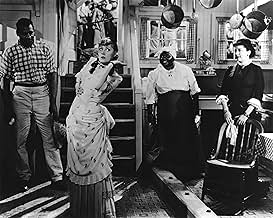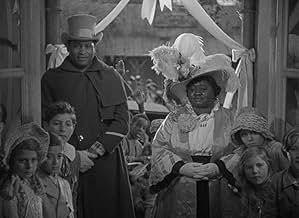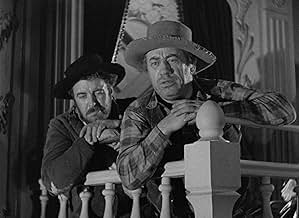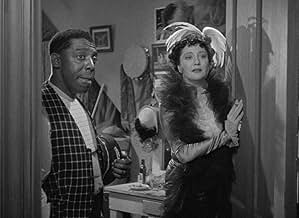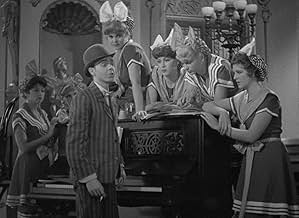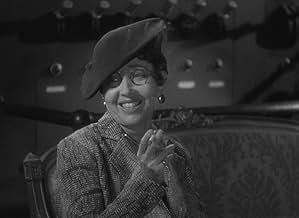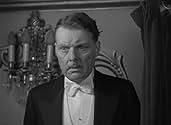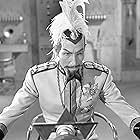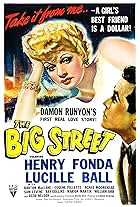IMDb RATING
7.4/10
3.9K
YOUR RATING
Despite her mother's objections, the naive young daughter of a show boat captain is thrust into the limelight as the company's new leading lady.Despite her mother's objections, the naive young daughter of a show boat captain is thrust into the limelight as the company's new leading lady.Despite her mother's objections, the naive young daughter of a show boat captain is thrust into the limelight as the company's new leading lady.
- Awards
- 3 wins & 1 nomination total
Maude Allen
- Fat Woman
- (uncredited)
Featured reviews
Sadly not available yet on DVD, the classic black-and-white 1936 version of the seminal 1927 Oscar Hammerstein-Jerome Kern musical is rarely seen these days since it's been overshadowed by the far more elaborate 1951 MGM color remake (which is on DVD). That's a shame since this one is like a piece of cameo jewelry from a bygone era, a sublimely entertaining piece of Americana so naïve in its approach that its pervasive use of racial stereotypes comes across more as quaint than demoralizing.
Directed by James Whale (the protagonist of 1998's "Gods and Monsters" and most famous for his 1931 classic, "Frankenstein"), it's a multi-generational story that starts with the Hawks family who runs a variety entertainment showboat in the 1880's. The jovial Captain Andy is the boat's impresario who is constantly goaded by his mean-spirited wife Parthy. They have a musically inclined daughter Magnolia who is best friends with the show's star, mulatto chanteuse Julie LaVerne. The local sheriff forces Julie out of the show for being half-black. Andy has Magnolia take her place just as gambler Gaylord Ravenal comes to town and becomes recruited as the show's leading man. Gaylord and Magnolia fall immediately in love, marry, move to Chicago and have a girl they named Kim. There, he gains and loses a fortune and then leaves Magnolia and Kim. Over the years, Magnolia becomes a big stage star and passes the torch to Kim.
The music, of course, is unbeatable with standards, chief among them "Make Believe", "Can't Help Lovin' That Man" and "You Are Love". Even though Irene Dunne was in her late thirties when she made this film, she amazingly gets away with the first half where she plays Magnolia as an ingénue. What's more, she was the rare actress who could act and sing (quite beautifully) at the same time, even when she is required to perform in blackface in "Gallivantin' Around". Allan Jones is a fine singer as Gaylord, though not as interesting an actor especially in the second half when misfortune takes over. When they sing "You Are Love" together, it's still quite magical.
What a treat to be able to see the redoubtable Paul Robeson as Joe singing "Ol' Man River" so powerfully (and filmed with an intriguing montage of woeful images), as well as legendary torch singer Helen Morgan play Julie and perform her signature song, "Bill", so touchingly. Familiar character actor Charles Winninger probably has his best role as Captain Andy, while Hattie McDaniel plays Joe's forceful wife Queenie in a performance as good as her Mammy in "Gone With the Wind". The film is really an intriguing mix of melodrama and great music with socially relevant observations regarding racism, alcoholism and gambling addiction.
Directed by James Whale (the protagonist of 1998's "Gods and Monsters" and most famous for his 1931 classic, "Frankenstein"), it's a multi-generational story that starts with the Hawks family who runs a variety entertainment showboat in the 1880's. The jovial Captain Andy is the boat's impresario who is constantly goaded by his mean-spirited wife Parthy. They have a musically inclined daughter Magnolia who is best friends with the show's star, mulatto chanteuse Julie LaVerne. The local sheriff forces Julie out of the show for being half-black. Andy has Magnolia take her place just as gambler Gaylord Ravenal comes to town and becomes recruited as the show's leading man. Gaylord and Magnolia fall immediately in love, marry, move to Chicago and have a girl they named Kim. There, he gains and loses a fortune and then leaves Magnolia and Kim. Over the years, Magnolia becomes a big stage star and passes the torch to Kim.
The music, of course, is unbeatable with standards, chief among them "Make Believe", "Can't Help Lovin' That Man" and "You Are Love". Even though Irene Dunne was in her late thirties when she made this film, she amazingly gets away with the first half where she plays Magnolia as an ingénue. What's more, she was the rare actress who could act and sing (quite beautifully) at the same time, even when she is required to perform in blackface in "Gallivantin' Around". Allan Jones is a fine singer as Gaylord, though not as interesting an actor especially in the second half when misfortune takes over. When they sing "You Are Love" together, it's still quite magical.
What a treat to be able to see the redoubtable Paul Robeson as Joe singing "Ol' Man River" so powerfully (and filmed with an intriguing montage of woeful images), as well as legendary torch singer Helen Morgan play Julie and perform her signature song, "Bill", so touchingly. Familiar character actor Charles Winninger probably has his best role as Captain Andy, while Hattie McDaniel plays Joe's forceful wife Queenie in a performance as good as her Mammy in "Gone With the Wind". The film is really an intriguing mix of melodrama and great music with socially relevant observations regarding racism, alcoholism and gambling addiction.
Stunning, astounding achievement for 1930s Hollywood cinema. An early talkie musical that boasts excellent sound and breathtaking cinematography that points the way to the modern era of movies, including closeups and all sorts of rolling and perspective shots that were new in their time. This adaptation of the legendary Broadway musical (considered the first modern musical) is shortened somewhat to keep it around two hours, so the plot often seems to race through some pretty dramatic events. Veterans from the stage version appear in key roles, including Charlie Winninger as Captain Andy, Paul Robeson as Joe and Helen Morgan as Julie. While there are several cringe-worthy "Negro" moments, including Irene Dunne performing in black face, at the very least Robeson is handled with respect throughout. I must be honest and admit I am not crazy about Dunne as Magnolia, although Allan Jones makes a fine Gaylord Ravenal. I think Universal might have found someone a bit softer around the edges to play Magnolia, as much as I admire most of Dunne's film work. This is an almost perfect movie, and it is amazing that it was shot on back lots. As with Edna Ferber's stories, on which it is based, SHOW BOAT will transport you to another time and place, at least for two hours.
What an exquisite and enjoyable film! Along with "The Great Garrick"(1937), "The Old Dark House"(1932) and "The Bride of Frankenstein"(1935), "Show Boat" is one of James Whale's loveliest and most enduring classics. By far, the best "Show Boat" ever captured on film. The plush 1951 MGM remake is a cartoon by comparison.
Like Whale's "The Great Garrick," the film is a delicate, self-reflexive study about the entrancing possibilities of the theater, or for that matter acting. Acting as a metaphor for life. One of delights of "Show Boat" is that it does not avoid depicting either the joy of make-belief (the basis of the theater) or its inevitable heartbreak. In this regard, it invites comparison to Jean Renoir's exquisite "French Cancan"(1955), another back stage musical that understands, accepts, and celebrates the difficulties and ultimately the magic of the theater.
In addition to being an honest and frank celebration of miscegenation, "Show Boat" is also a genuinely felt evocation of a stage actress (wonderfully played by Irene Dunne in one of her greatest performances ever), who goes from a stagestruck teen to a mature woman seriously dealing with the consequences of a marriage to a gambler(played by the occasionally bland Allan Jones).
Paul Robeson's extraordinary, melodious rendition of "Ol' Man River" is the highlight of the film, occasioning in great and inventive montage sequence.
A great film.
Like Whale's "The Great Garrick," the film is a delicate, self-reflexive study about the entrancing possibilities of the theater, or for that matter acting. Acting as a metaphor for life. One of delights of "Show Boat" is that it does not avoid depicting either the joy of make-belief (the basis of the theater) or its inevitable heartbreak. In this regard, it invites comparison to Jean Renoir's exquisite "French Cancan"(1955), another back stage musical that understands, accepts, and celebrates the difficulties and ultimately the magic of the theater.
In addition to being an honest and frank celebration of miscegenation, "Show Boat" is also a genuinely felt evocation of a stage actress (wonderfully played by Irene Dunne in one of her greatest performances ever), who goes from a stagestruck teen to a mature woman seriously dealing with the consequences of a marriage to a gambler(played by the occasionally bland Allan Jones).
Paul Robeson's extraordinary, melodious rendition of "Ol' Man River" is the highlight of the film, occasioning in great and inventive montage sequence.
A great film.
When we talk about adaptions of Show Boat for the screen, we talk first about this one and then the others. If for no other reason than it gives us a chance to see three of the original performers from the original Broadway cast, Charles Winninger, Helen Morgan, and Francis X. Mahoney. Their performances on stage and on the screen became career roles for each.
Also Allan Jones and Irene Dunne are as perfect a Gaylord Ravenal and Magnolia Hawkes as you'll ever find. Irene was THE Jerome Kern girl on the silver screen, she was lucky to be in three musical adaptions of his shows, this one and Roberta and Sweet Adeline. His songs and her voice seem to be made for each other.
Ravenal's part is one of the most difficult to do in musicals. In the 1951 Show Boat Howard Keel sang wonderfully, but he projects too strong an image for the part. Gaylord Ravenal is a charming, but a very weak character. Allan Jones was the one who really got it right and it's on Ravenal's performance that the whole plot of the show turns on. He really rings true in Hattie McDaniel's assessment of him as the kind of gentlemen it's a pleasure to wait on.
James Whale as director really captures the spirit of 20 years on each side of the turn of the last century with warts and all. Show Boat as a play was bold in its day in tackling racism and miscegenation. Even when this was produced first in 1927 there were still miscegenation laws on the books. He gave Helen Morgan the career role she was most identified with.
Helen Morgan personified the phrase torch singer. From 1927 until this film she had descended into alcoholism and five years from this film she would have passed away from the effects of same. She had a career in Hollywood as well as Broadway and this was her final effort. How fortunate we are to have a filmed record of her performance and her singing of Can't Help Lovin' That Man and Bill.
Ravenal and Magnolia are given three great ballads to sing, classics all, Make Believe and You Are Love and Why Do I Love You. The first two are sung by Jones and Dunne and the third was eliminated from the film although it is heard on the soundtrack. Jerome Kern and Oscar Hammerstein wrote another song I Have the Room Above which is also a most charming duet.
Of course no discussion of Show Boat is complete without Paul Robeson and Ol' Man River. Believe it or not Robeson wasn't in the original Broadway cast. The Broadway opening was delayed and Robeson had some other contractual commitments in 1927. Another black baritone concert singer named Jules Bledsoe introduced Ol' Man River, arguably the greatest song Jerome Kern ever wrote. It became a signature song for Paul Robeson in both stage performances of Show Boat and in this film. His presence in singing Ol' Man River is another reason for this being the greatest Show Boat of all.
Robeson also has a duet with Hattie McDaniel in I Still Suits Me another song Kern and Hammerstein wrote for this film. It's a nice comedy duet. In fact I would say that Show Boat and Annie Get Your Gun are the two shows with the most hit songs in them ever written.
Show Boat is a grand American classic. Somewhere as I write this review there is a company performing right now on this planet. It will be so for generations to come.
Also Allan Jones and Irene Dunne are as perfect a Gaylord Ravenal and Magnolia Hawkes as you'll ever find. Irene was THE Jerome Kern girl on the silver screen, she was lucky to be in three musical adaptions of his shows, this one and Roberta and Sweet Adeline. His songs and her voice seem to be made for each other.
Ravenal's part is one of the most difficult to do in musicals. In the 1951 Show Boat Howard Keel sang wonderfully, but he projects too strong an image for the part. Gaylord Ravenal is a charming, but a very weak character. Allan Jones was the one who really got it right and it's on Ravenal's performance that the whole plot of the show turns on. He really rings true in Hattie McDaniel's assessment of him as the kind of gentlemen it's a pleasure to wait on.
James Whale as director really captures the spirit of 20 years on each side of the turn of the last century with warts and all. Show Boat as a play was bold in its day in tackling racism and miscegenation. Even when this was produced first in 1927 there were still miscegenation laws on the books. He gave Helen Morgan the career role she was most identified with.
Helen Morgan personified the phrase torch singer. From 1927 until this film she had descended into alcoholism and five years from this film she would have passed away from the effects of same. She had a career in Hollywood as well as Broadway and this was her final effort. How fortunate we are to have a filmed record of her performance and her singing of Can't Help Lovin' That Man and Bill.
Ravenal and Magnolia are given three great ballads to sing, classics all, Make Believe and You Are Love and Why Do I Love You. The first two are sung by Jones and Dunne and the third was eliminated from the film although it is heard on the soundtrack. Jerome Kern and Oscar Hammerstein wrote another song I Have the Room Above which is also a most charming duet.
Of course no discussion of Show Boat is complete without Paul Robeson and Ol' Man River. Believe it or not Robeson wasn't in the original Broadway cast. The Broadway opening was delayed and Robeson had some other contractual commitments in 1927. Another black baritone concert singer named Jules Bledsoe introduced Ol' Man River, arguably the greatest song Jerome Kern ever wrote. It became a signature song for Paul Robeson in both stage performances of Show Boat and in this film. His presence in singing Ol' Man River is another reason for this being the greatest Show Boat of all.
Robeson also has a duet with Hattie McDaniel in I Still Suits Me another song Kern and Hammerstein wrote for this film. It's a nice comedy duet. In fact I would say that Show Boat and Annie Get Your Gun are the two shows with the most hit songs in them ever written.
Show Boat is a grand American classic. Somewhere as I write this review there is a company performing right now on this planet. It will be so for generations to come.
This movie is a wonderful stage-to-screen musical film. It stuck to the original musical play and had wonderful stars. Irene Dunne as the young innocent Magnolia Hawks, Allan Jones as the charming gambler Gaylord Ravenal, Charles Winninger as Cap'n Andy Hawks, Paul Robenson as Joe, and Helen Morgan, in the role she originated on stage, as Julie LaVerne. This film is a musical drama with comedy and racial references. This film is a great musical about racial differences and the reactions of people, back then, with different races. That is what makes this film a landmark musical and also one of AFI's 100 Years of Musicals and was #24 out of 25 musicals. This version of "Show Boat" is known to be the best movie version of all three movie versions. The 1929 version was not done very well because it was a very early talkie and the numbers weren't heard correctly. The 1951 version was much too sanitized and it took out the value of the whole show. "Show Boat" is a very entertaining and beautiful film.
Did you know
- TriviaSpecial permission had to be granted from the Hays Office in order to retain the famous miscegenation (interracial marriage) sequence in the movie. Miscegenation was banned as a film subject, and had been excluded from Show Boat (1929).
- GoofsWhen Joe begins to sing "Ol' Man River", he picks up a board and begins to whittle it. He slices off two pieces, and then the camera switches to an oblique shot, but now the board is whittled to a slender rod.
- Crazy creditsIn the opening credits, there is a cardboard cutout display of a show boat parade, with cutout paper townspeople watching it, on a moving turntable. The parade revolves past the camera carrying cardboard banners on which are printed the title and other credits. Most of the parade figures are simply figures, but among them cutouts of Paul Robeson and Helen Morgan can be seen. (The appearance of these figures does not coincide with the appearance of their names onscreen.) In the background shadows of a paddlewheel and a riverboat can be seen.
- ConnectionsFeatured in The All Talking, All Singing, All Dancing Show (1973)
- SoundtracksCotton Blossom
(1927) (uncredited)
Music by Jerome Kern
Lyrics by Oscar Hammerstein II
Sung by offscreen mixed chorus (during opening credits) and in opening scene by mixed chorus of dock workers
Details
- Release date
- Country of origin
- Language
- Also known as
- Edna Ferber's Show Boat
- Filming locations
- Production company
- See more company credits at IMDbPro
- Runtime
- 1h 53m(113 min)
- Color
- Aspect ratio
- 1.37 : 1
Contribute to this page
Suggest an edit or add missing content

